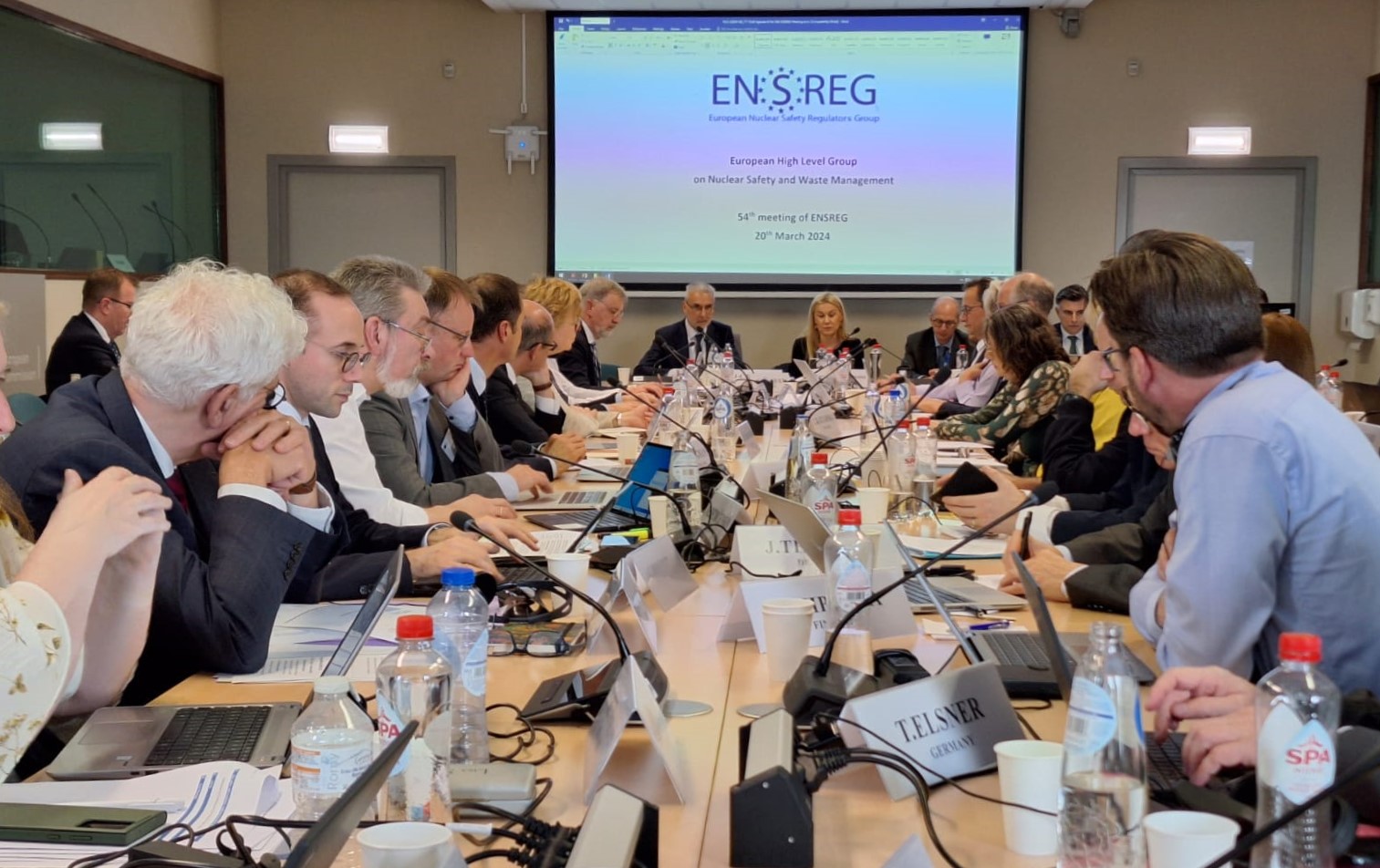Contenido principal
2024
European Nuclear Safety Regulators Group (ENSREG) approves its 2026 work program
The new plan establishes the improvement of the performance of the IRRS/ARTEMIS missions and of the implementation of the nuclear safety directive
The organization reiterated the absolute priority of safety in the use of nuclear energy
Energy Commissioner Kadri Simson recalled the importance of having strong regulators to achieve the set goals

The European Nuclear Safety Regulators Group (ENSREG), chaired by Juan Carlos Lentijo, president of the Spanish Nuclear Safety Council, held its 54th meeting in Brussels, where it approved its work program for the period 2024-2026. The program establishes the actions to implement post-Fukushima measures from the national action plans and the performance of IRRS/ARTEMIS missions organized by the International Atomic Energy Agency (IAEA). It also approves the follow up on activities to support the implementation of the European nuclear safety directive and the report on lessons learned from the first topical peer review exercise (TPR-I) on ageing management. In addition, this new program also includes follow-up activities for TPR-II, which focuses on fire protection in nuclear facilities.
In a joint statement, approved by all members, the organisation reiterated the absolute priority of safety in the use of nuclear energy. In the same way, the Euratom Treaty's legal framework established a high standard in the European Union for nuclear safety, radiation protection, and the management of spent fuel and radioactive waste. This statement would be presented at the Nuclear Energy Summit that was held at the end of that week in Brussels. The organisation was also committed to establish channels of collaboration with the Western European Nuclear Regulators Association (WENRA), which brings together nuclear safety regulatory bodies of different countries.
The European Commissioner for Energy, the Estonian Kadri Simson, spoke at the end of the meeting to share the main political and regulatory challenges of nuclear energy. Simson assured that it is necessary to have 'strong and independent' regulators to achieve the purposes of using nuclear energy in the future. Furthermore, the Commissioner encouraged ENSREG to interact with other reference institutions in the field of new nuclear technologies such as the European Industrial Alliance for SMRs or other organisations specialised in fusion research.
Working Groups
The head of the working group on nuclear safety and international cooperation (WG1), Iga Pocztarek-Tofi, from the Polish regulatory body, reviewed the main activities in which the group is involved. She highlighted the updates of the National Action Plans of each country and the conclusions on the European program of EU-IRRS missions (Integrated Regulatory Review Service, IRRS) to identify improvements in regulations and provide good practices to member states.
The working group on waste management and decommissioning (WG2), chaired by the Belgian Marc Demarche, presented its progress in the last year. He presented the technical position on the classification of radioactive waste in the European Union and the study on the management of radioactive waste from medical uses or the optimisation of the ARTEMIS mission’s process.
João Oliveira Martins, from the Agência Portuguesa do Ambiente (APA), reported on the news of the group on communication and transparency with the public and stakeholders (WG3). Martins informed ENSREG of the next steps in the document that includes the draft of the Terms of Reference (ToR) that will be applicable to the discussion group contemplated in the strategy of participation of stakeholders in the second thematic peer review exercise (TPR-II). He also commented the proposals for improvement of public participation in this type of activity.
Other matters
Participants addressed issues such as the report on stress tests in third countries, the nuclear safety in Ukraine -through updated information provided by the Ukrainian regulator (SNRIU)- or the Commission's progress report on Small Modular Reactors (SMRs) and the line of work on their licensing.
The latest developments on the seventh ENSREG Conference, which will take place next June, and the review of the facilities proposed by the participating countries, including CSN technicians, have also been presented.
ENSREG is a high-level advisory group created in 2007 at the request of the European Commission to raise recommendations to the Council of the European Union and the European Parliament on Nuclear Safety and Nuclear Waste Management. CSN participates in its meetings as well as in ENSREG working groups dedicated to the areas of Nuclear Safety, Radioactive Waste and Spent Fuel Management, International Cooperation and Communication and Transparency of the regulatory body. Since January 2024, the chair of this international organisation has fallen to Juan Carlos Lentijo, president of the CSN.
* Check here the glossary of technical terms *
